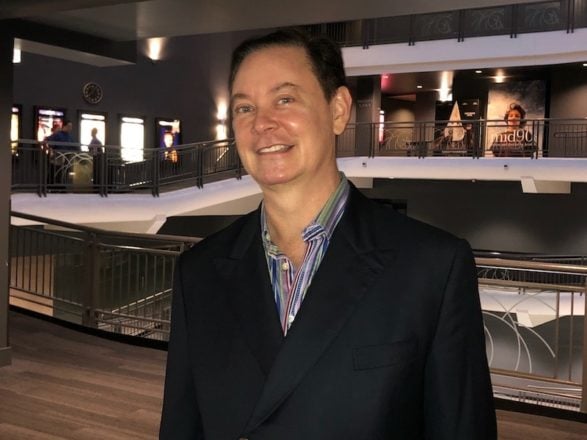CHICAGO — The documentary “Far From the Tree,” based on Andrew Solomon’s 2012, New York Times best-selling book of the same name, confronts people’s preconceived notions of what it means to be “normal.”
Solomon, a Columbia University psychology professor, wrote his book after coming out to his mother and father and their reaction was less than favorable.
Solomon worked through his understanding of love and acceptance, and took it upon himself to take a deeper look at what other parents go through when their children don’t fit into accepted norms.
In the film, for example, some of the children have Down Syndrome or dwarfism.
“Far From the Tree” is available on many digital platforms. Check out the website to find a provider or request an educational screening.
Directed by Rachel Dretzin,“Far From the Tree” is a shorter version of Solomon’s book, which is almost 1,000 pages and includes more than 300 families. Dreztin’s movie is 93 minutes and follows five families, two from the book and three new ones.
Solomon’s personal journey is woven into the documentary.
Solomon also is an LGBTQ activist and a board member with the National Gay and Lesbian Task Force.
Solomon lives with his husband, John Habich Solomon, and son, George, in New York and London. Solomon also has a daughter with a college friend. Habich Solomon is the biological father of two children with lesbian friends in Minneapolis. Those children are also part of the Solomon.
In an interview with Q Voice News, Solomon, 54, who was in Chicago promoting the film, discusses his book and the documentary, the film’s message, and how priviliege may impede the future of LGBTQ equality.
Here are some excerpts.
On writing the book:
“Working on the book, I realized there was a difference between love and acceptance,” Solomon says. “I felt that my mother didn’t love me when she was having all that trouble accepting me. After working on the book and then the film, I felt as though my mother always loved me, but she had a lot of trouble accepting me.
“Lots of people have trouble accepting their children. Acceptance is a process, and it always takes time,” Solomon says. “All in all, my mother said all the right things before she died. I don’t think she fully meant them, but she did at least say them,” Solomon says with a laugh.
On making the movie:
“I was approached by 30 filmmakers after the book came out who wanted to make a documentary, which was very overwhelming,” Solomon says. “The whole scale of the operations is dizzying. I felt ill-qualified to judge, but I felt that Rachel understood the deep meaning of the book better than anyone else I talked to. I felt that she had a real understanding that the movie had to be very different from the book, and she had real ideas of how to make that difference.”

Andrew Solomon, a Columbia University psychology professor, wrote his book “Far From the Tree” after coming out to his mother and father and their less than favorable reaction. A condensed version of his book has been made into a documentary. Photo: Pamela Powell for Q Voice News.
On being a gay parent:
“I try to be much more accepting than I probably would have been otherwise,” Solomon says. “My natural instinct is perfectionism. That runs in the family. I try to keep it under control with my kids and to be appreciative of them for who they are and not to have a lot of set ideas of who they should be. It’s made me kinder and more accepting.”
‘Fenrir Chronicles: The Prince’ fantasy book inspired by gay brother
On inclusion:
“When I started working on the book, I had the idea that inclusion was this lovely idea, academic inclusion, where these disabled children would get a much better education than they’d ever get on their own,” Solomon says. “They got it by virtue of being in with the mainstream population. But I thought it must be kind of a nuisance for the non-disabled children to be so slowed down by having a disabled child to deal with the whole time.
On diversity:
“By the time I finished working on the book and then the film, I felt that actually the people who benefit the most are the non-disabled children,” Solomon says. “By virtue of being exposed to someone who’s different, they used to be afraid of or daunted by that difference, they have come to accept them as part of the spectrum of diversity.”
On the film’s message:
“I would like it to make it easier for the parents of children with differences. I would like it to make things easier for children with differences,” Solomon says. “I would like it to accelerate the process of acceptance and help parents get there faster.
“This film is about compassion,” Solomon says. “I hope it will reach out to a larger group of people and say, ‘All those people you’re ready to write off, they may have something to say. They may be incredibly bright. They may be incredibly interesting. Don’t throw anyone away.”
On wealth and LGBTQ equality:
“There’s obviously been enormous progress with gay marriage and all of these rights, but I feel like these rights are more and more segregated,” Solomon says. “If you have a reasonably good level of prosperity and education, you can claim a lot of rights that will elude you if you’re growing up in poverty and without access to privilege.
On privilege and LGBTQ equality:
“I feel like there’s going to be more and more of a divide between what more privileged gay people experience and less privileged gay people experience,” Solomon says. “The more privileged, we all have a moral responsibility to try to ensure that the rights that we have are shared by the people with less privilege.”
